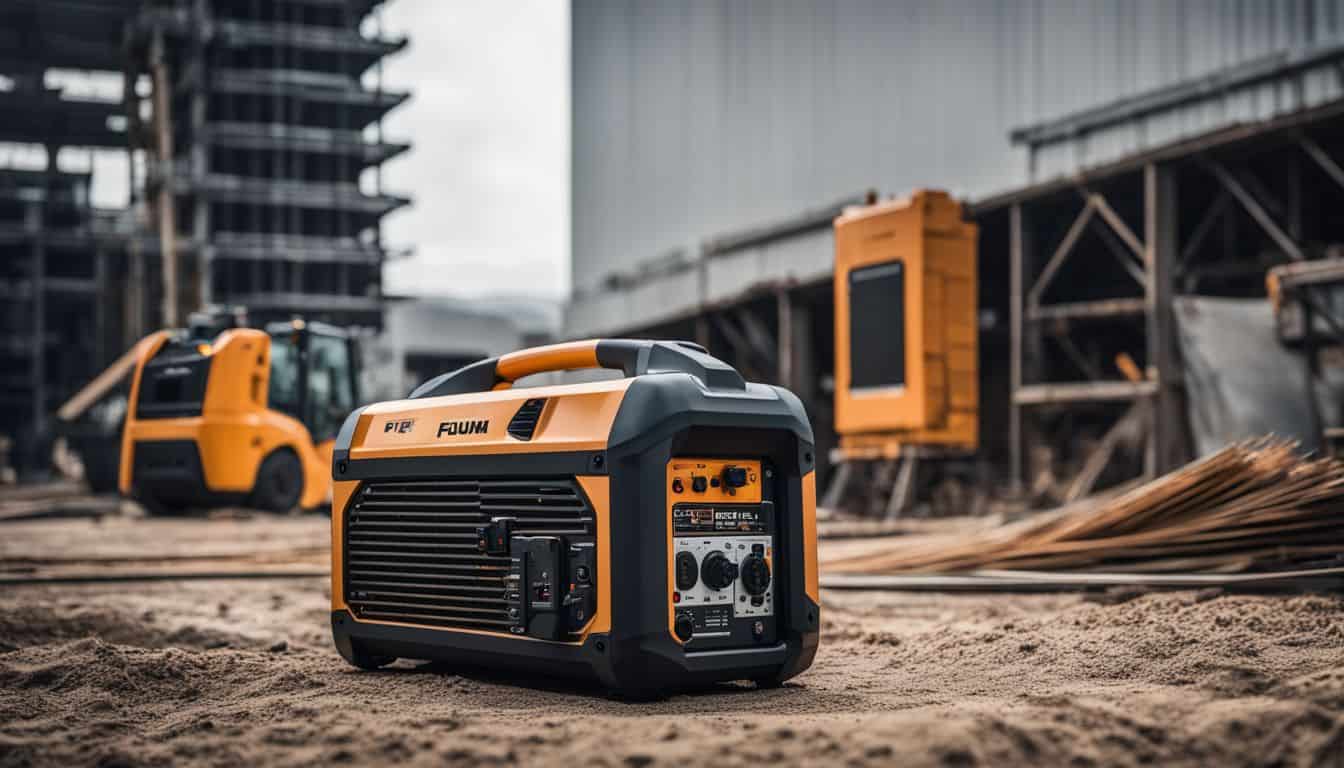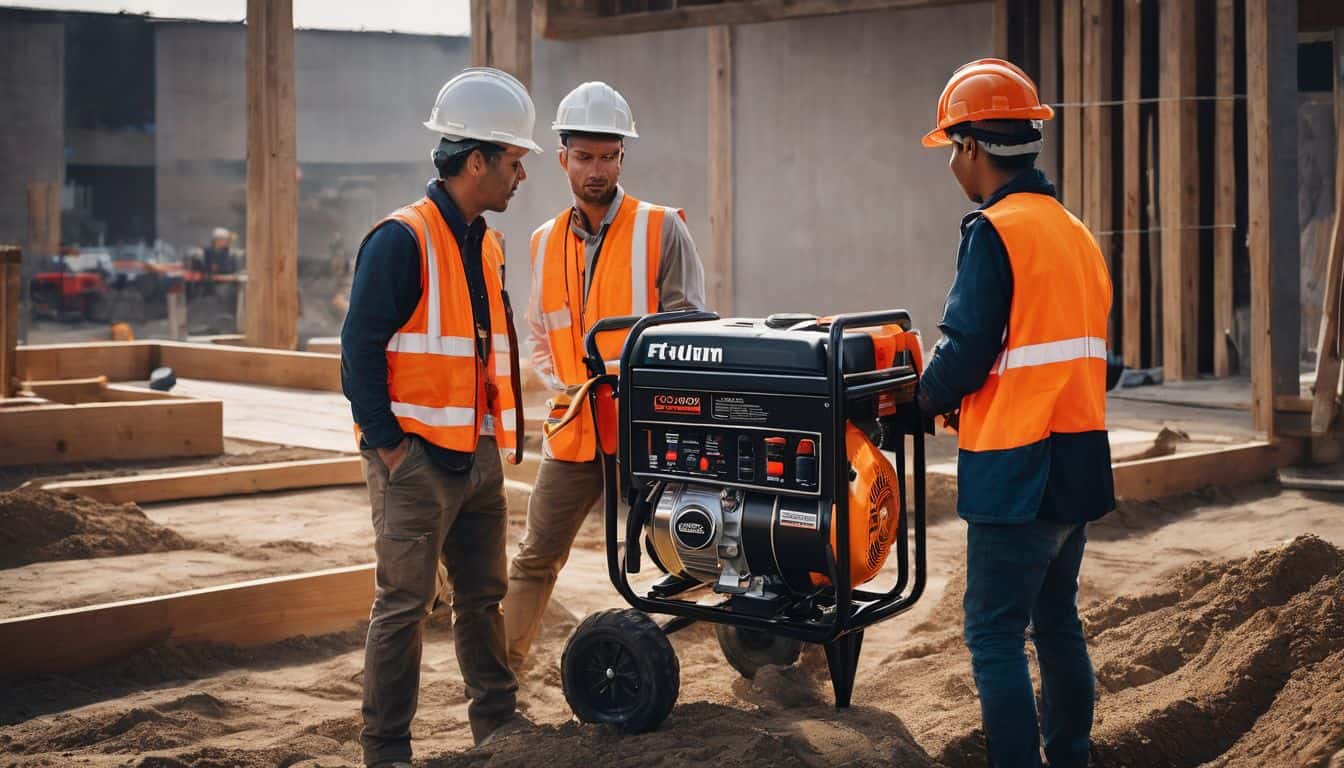In the dynamic world of construction, reliable power is crucial for keeping projects on track and ensuring productivity. Portable generators have become indispensable tools on construction sites, providing the flexibility and power needed to operate various equipment and tools. This guide will explore the essential aspects of using portable generators in construction settings, helping you make informed decisions for your project’s power needs.
Benefits of Portable Generators for Construction
Portable generators offer numerous advantages for construction sites:
- On-Demand Power Supply: They provide immediate access to electricity in areas where grid power is unavailable or insufficient. This is particularly valuable in remote locations or during the early stages of construction when permanent power connections are not yet established.
- Mobility and Flexibility: Easy to move around the site as work progresses, adapting to changing power needs. This mobility allows for efficient use of resources, as generators can be relocated to power different areas of the site as construction phases shift.
- Cost-Efficiency: Often more economical than establishing temporary grid connections, especially for short-term projects. The initial investment in a portable generator can be offset by the savings in electrical infrastructure setup and ongoing utility costs.
- Versatility: Can power a wide range of construction equipment, from power tools to lighting systems. This versatility makes portable generators suitable for various construction tasks, from small residential projects to large commercial developments.
Types of Portable Generators for Construction
Choosing the right type of generator is crucial for optimal performance:
- Diesel Generators: Known for their durability and fuel efficiency, they are ideal for long-running applications. Diesel generators are often preferred for larger construction sites due to their ability to handle heavy loads and operate continuously for extended periods.
- Gasoline Generators: More common and generally less expensive, suitable for smaller jobs or as backup power. These generators are often more portable and easier to refuel, making them ideal for smaller construction sites or as supplementary power sources.
- Propane Generators: Cleaner burning and with a longer shelf life for fuel, good for environmentally sensitive areas. Propane generators are increasingly popular due to their lower emissions and the ease of storing propane for extended periods without degradation.
- Dual-Fuel Options: Offer flexibility in fuel choice, adapting to availability and cost considerations. These generators can switch between fuel types, providing adaptability in various situations and helping to manage fuel costs.
For a comprehensive understanding of different generator types and their applications, check out our article on the basics of portable generators explained.
Sizing and Power Requirements
Proper sizing is critical to ensure your generator can handle the load without overworking or underutilizing the equipment. Calculate the total wattage of all tools and equipment that will run simultaneously, including starting watts for motors. Always add a 20% buffer for unexpected power needs or future expansion.
Consider the specific power requirements of different construction phases. For example, the power needs during foundation work may differ significantly from those during interior finishing. Planning for these variations can help in selecting the most appropriate generator size or in deciding whether multiple generators of different sizes might be more efficient.
Safety Considerations
Safety should be the top priority when using generators on construction sites:
- Proper Placement and Ventilation: Always operate generators outdoors, away from enclosed spaces in order to prevent carbon monoxide buildup. Ensure there’s adequate clearance around the generator for proper cooling and ventilation.
- Electrical Safety and Grounding: Ensure proper grounding and use GFCI protection to prevent electrical hazards. Regularly inspect cords and connections for wear or damage.
- Fuel Handling and Storage: Store fuel in approved containers away from heat sources and living areas. Implement a clear protocol for safe fuel handling and storage on the construction site.
- Noise Reduction Strategies: Use sound barriers or enclosures to minimize noise pollution, especially in residential areas. Consider the impact of generator noise on workers and surrounding neighborhoods when planning generator placement.
- Fire Safety: Keep fire extinguishers readily available near generator locations and train workers on their proper use.
Maintenance and Care
Regular maintenance is crucial for reliable operation:
- Follow manufacturer-recommended maintenance schedules, including oil changes and filter replacements. Keep detailed records of all maintenance activities.
- Implement a refueling procedure that minimizes spills and contamination. Train all relevant personnel on proper refueling techniques.
- Train operators to recognize and address common issues like overloading or overheating. Establish a clear protocol for reporting and addressing generator problems.
- Conduct regular inspections of generator components, including fuel lines, electrical connections, and exhaust systems.
Environmental Considerations
Be mindful of the environmental impact:
- Comply with local emissions regulations, which may require using newer, cleaner-burning models. Stay informed about changing environmental regulations that may affect generator use on construction sites.
- Optimize fuel efficiency by properly sizing generators and managing loads. Consider implementing load management systems to ensure generators operate at optimal efficiency.
- Implement noise pollution management strategies, especially for projects in noise-sensitive areas. This might include using acoustic enclosures or scheduling noisy activities during less disruptive hours.
- Explore the use of biodiesel or other alternative fuels where appropriate to further reduce environmental impact.
Best Practices for Generator Use on Construction Sites
Implementing best practices ensures efficient and safe generator use:
- Proper Setup: Follow manufacturer guidelines for setup and connection. Ensure all operators are trained in correct setup procedures.
- Load Management: Distribute loads evenly and avoid overloading the generator. Use load monitoring devices to prevent excessive strain on the generator.
- Emergency Procedures: Establish and train staff on emergency shutdown procedures. Conduct regular drills to ensure all workers are familiar with these procedures.
- Weather Protection: Implement measures to protect generators from adverse weather conditions, such as rain covers or elevated platforms in flood-prone areas.
- Security: Secure generators to prevent theft or unauthorized use, especially on large or open construction sites.
For detailed information on optimizing your generator setup, visit our guide on portable generator setups for efficient power distribution.

Usage Examples
Real-world examples highlight the effectiveness of portable generators in construction:
- High-Rise Construction: A 50-story building project used multiple synchronized diesel generators to power cranes and elevators, ensuring continuous operation throughout the construction phase. The project manager reported a 30% increase in efficiency due to the reliable power supply.
- Remote Bridge Repair: A propane generator provided power for welding equipment and lighting in a remote location, enabling critical repairs without access to grid power. The use of propane reduced fuel transportation costs and minimized environmental impact in the sensitive riverine ecosystem.
- Residential Development: A series of dual-fuel generators was used to power tools and temporary offices across a large residential construction site, offering flexibility in fuel choice based on availability and cost. This approach allowed the construction team to optimize fuel costs while maintaining a consistent power supply.
- Historical Renovation: A small, quiet inverter generator was used for precision work in a historical building renovation, providing clean power for sensitive electronic equipment while meeting strict noise regulations in the urban setting.
Conclusion
Portable generators are vital tools for modern construction sites, offering the flexibility, power, and reliability needed to keep projects moving forward. The key to successful generator use on construction sites lies in careful planning, proper selection, and diligent maintenance. By understanding the types of generators available, implementing proper sizing and safety measures, and following best practices for operation and maintenance, construction teams can maximize the benefits of these versatile power sources.
FAQS
Why are portable generators essential on construction sites?
Portable generators play a crucial role on construction sites because:
- They provide power in locations where electricity is not readily available
- They allow workers to operate tools and equipment in remote areas
- They keep the project running during unexpected power outages or surges
- They enable work to continue on schedule, preventing costly delays
What are the different types of portable generators used in construction?
Construction sites utilize various types of portable generators depending on the power needs:
- High-powered generators for running heavy machinery and large equipment
- Medium-powered generators for powering standard tools and devices
- Standby generators that automatically start when the main power goes out
- Inverter generators for sensitive electronics and quieter operation
How can using portable generators save money on construction projects?
Portable generators can lead to cost savings in construction by:
- Reducing downtime and delays caused by lack of power or outages
- Allowing teams to work longer hours or multiple shifts to meet deadlines
- Eliminating the need to run expensive power lines to remote job sites
- Providing a cheaper alternative to renting large stationary generators
What safety precautions should be taken when using portable generators?
To operate portable generators safely on construction sites, follow these guidelines:
- Place the generator outdoors on a flat, stable surface away from windows and doors
- Keep the generator dry and protected from rain or moisture
- Never operate a generator indoors or in enclosed spaces due to carbon monoxide risk
- Use properly rated extension cords and avoid overloading the generator
How can portable generators be set up efficiently on a job site?
Efficient portable generator setups for construction sites include:
- Parallel operation systems that link multiple generators for increased power output
- Skid-mounted generators that are pre-wired and ready for quick deployment
- Using transfer switches to safely connect the generator to the site’s electrical system
- Strategically placing generators to minimize cable runs and power loss
What maintenance is required to keep portable generators running smoothly?
To ensure the reliable performance of portable generators on construction sites, perform regular maintenance:
- Check and change the oil according to the manufacturer’s recommendations
- Inspect and clean the air filter to maintain proper airflow and efficiency
- Drain and replace the fuel if the generator will be stored for extended periods
- Test the battery and charging system to ensure dependable starting
How can I determine the right size portable generator for my construction needs?
To select an appropriately sized portable generator for your construction site, consider these factors:
- Calculate the total wattage of all tools and equipment that will run simultaneously
- Choose a generator with a power output exceeding the total wattage requirement
- Factor in any additional capacity needed for future growth or unexpected demands
- Consult with a professional or the generator manufacturer for specific recommendations

Leave a Reply